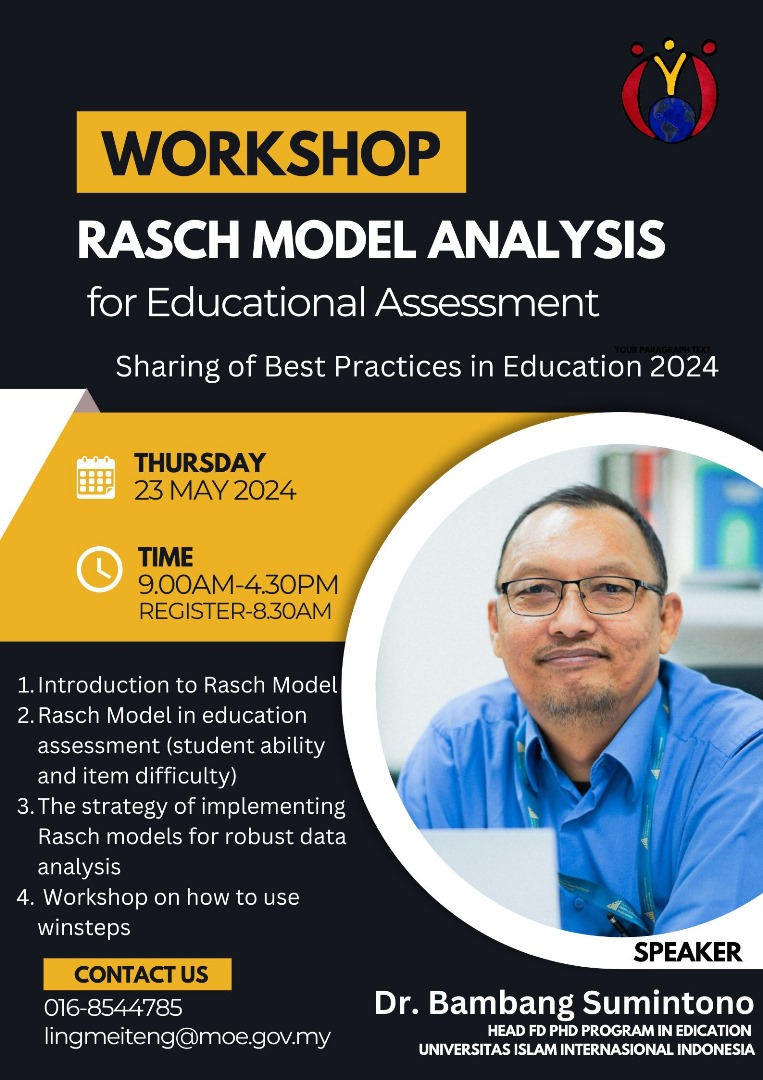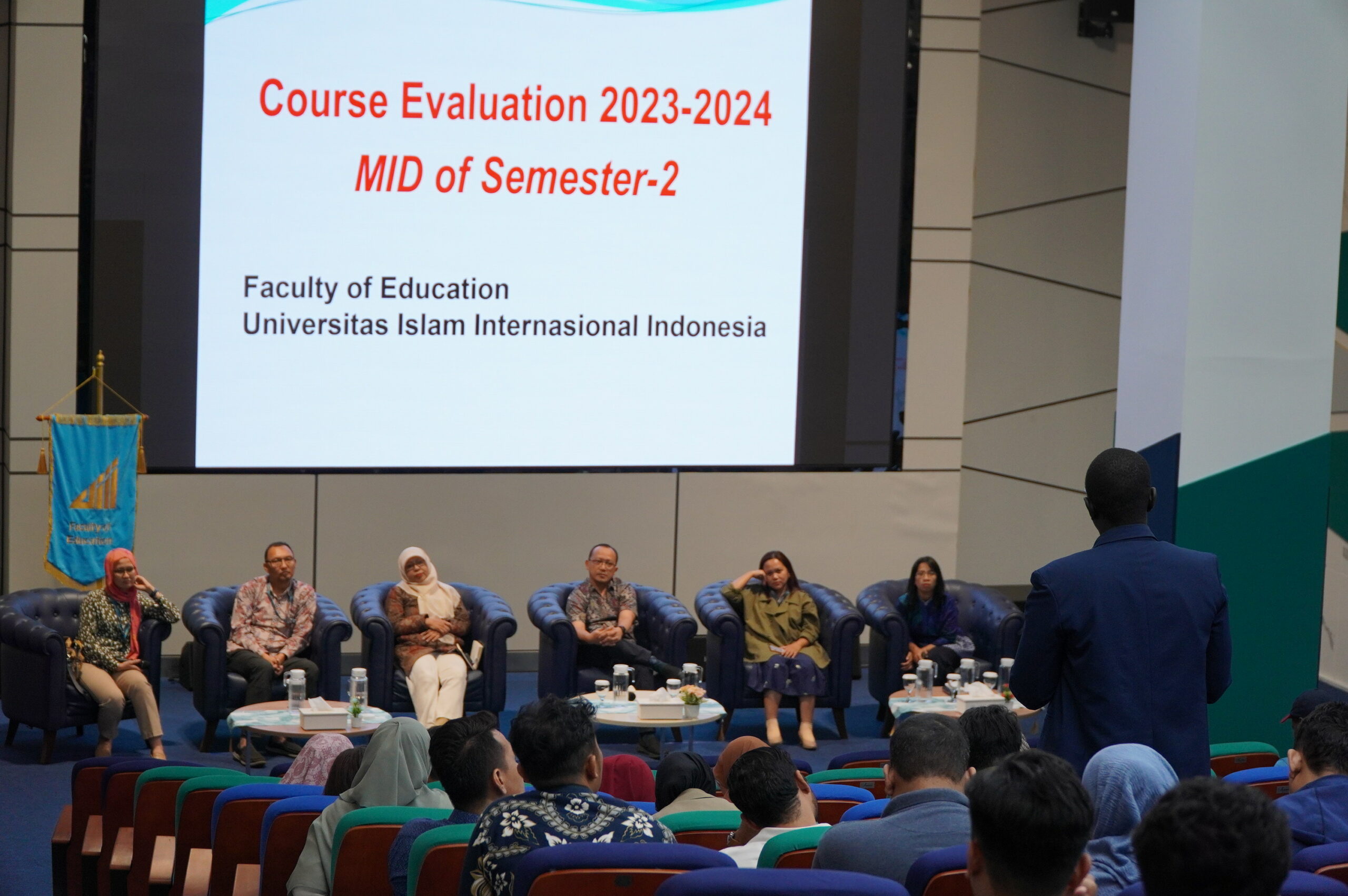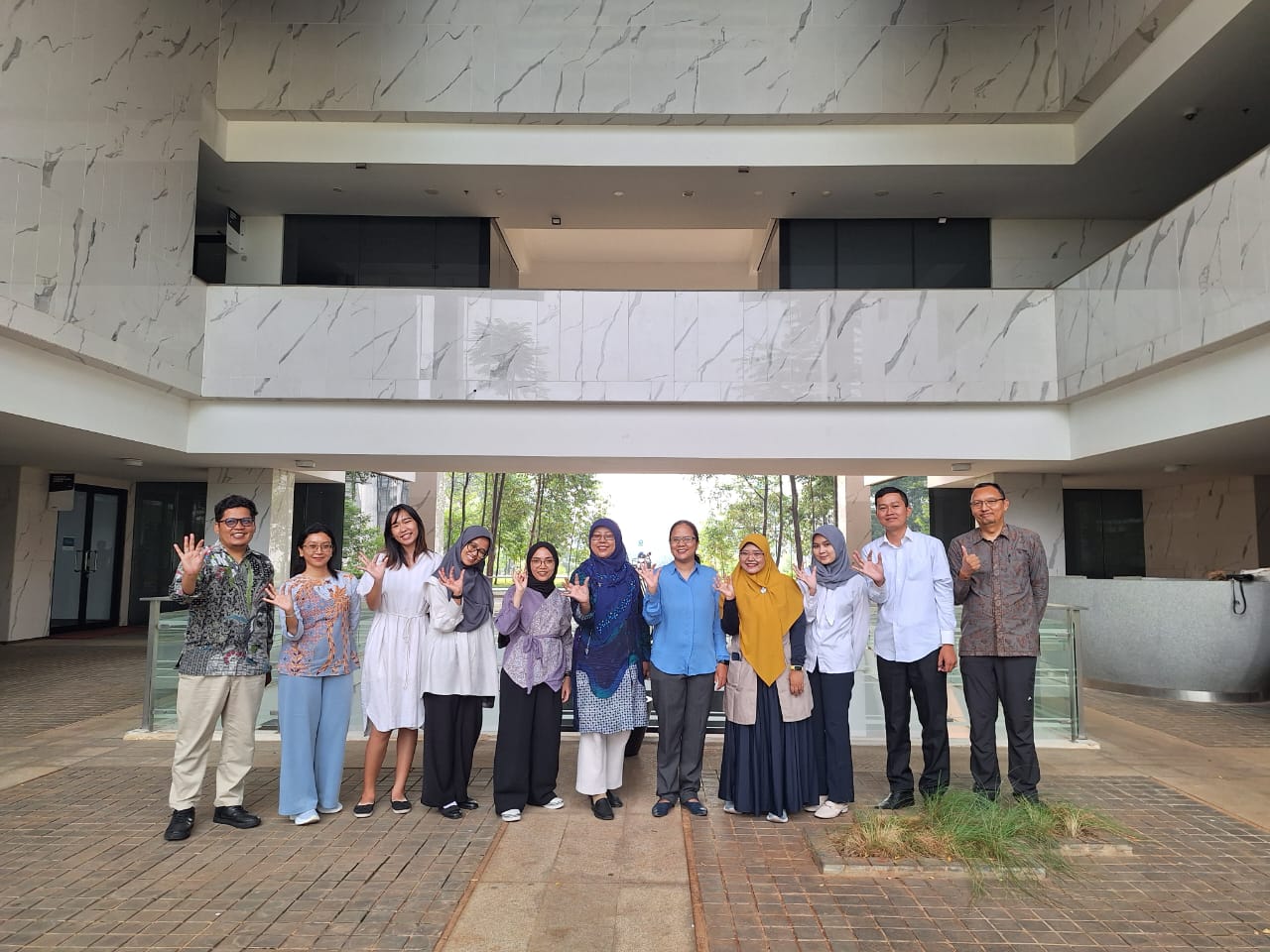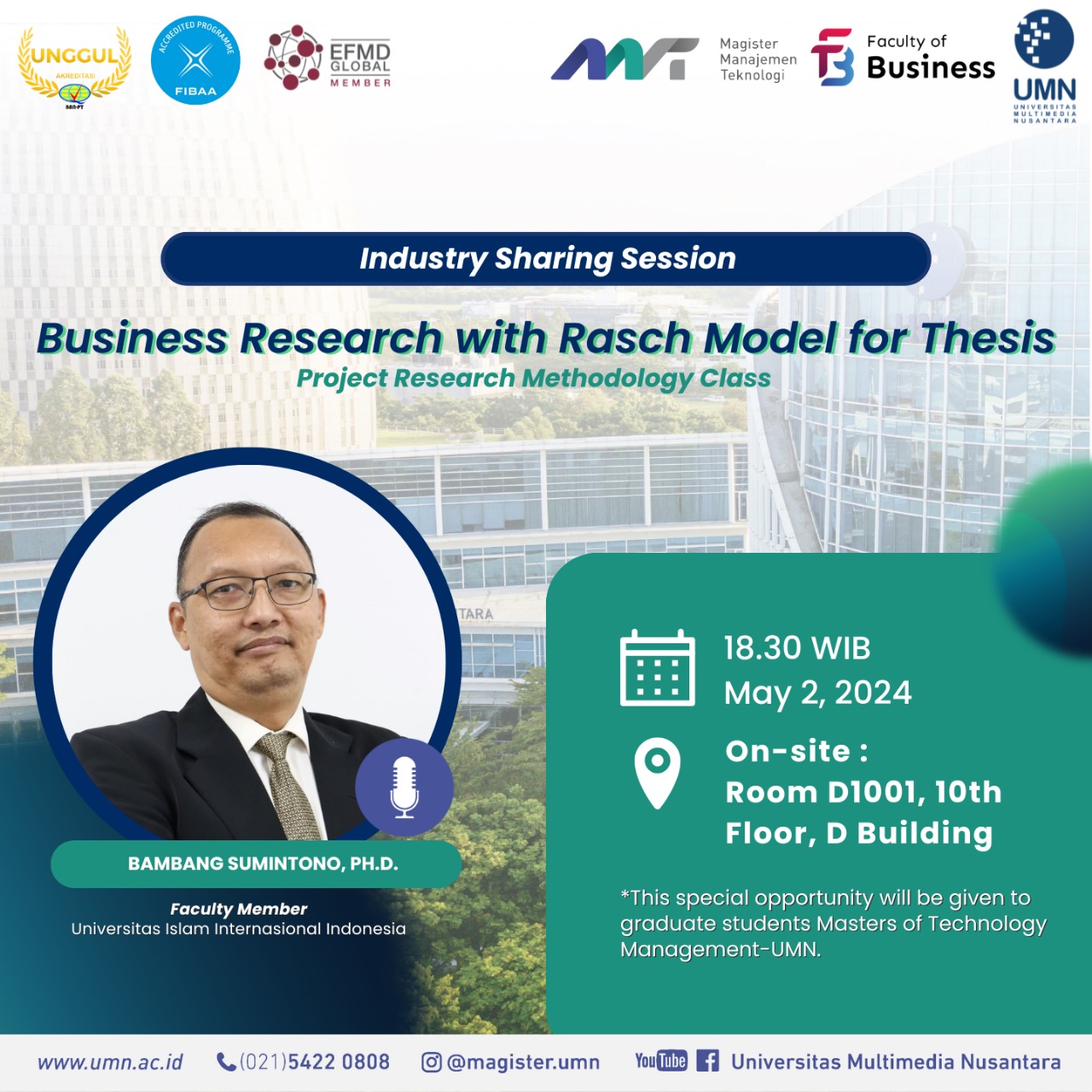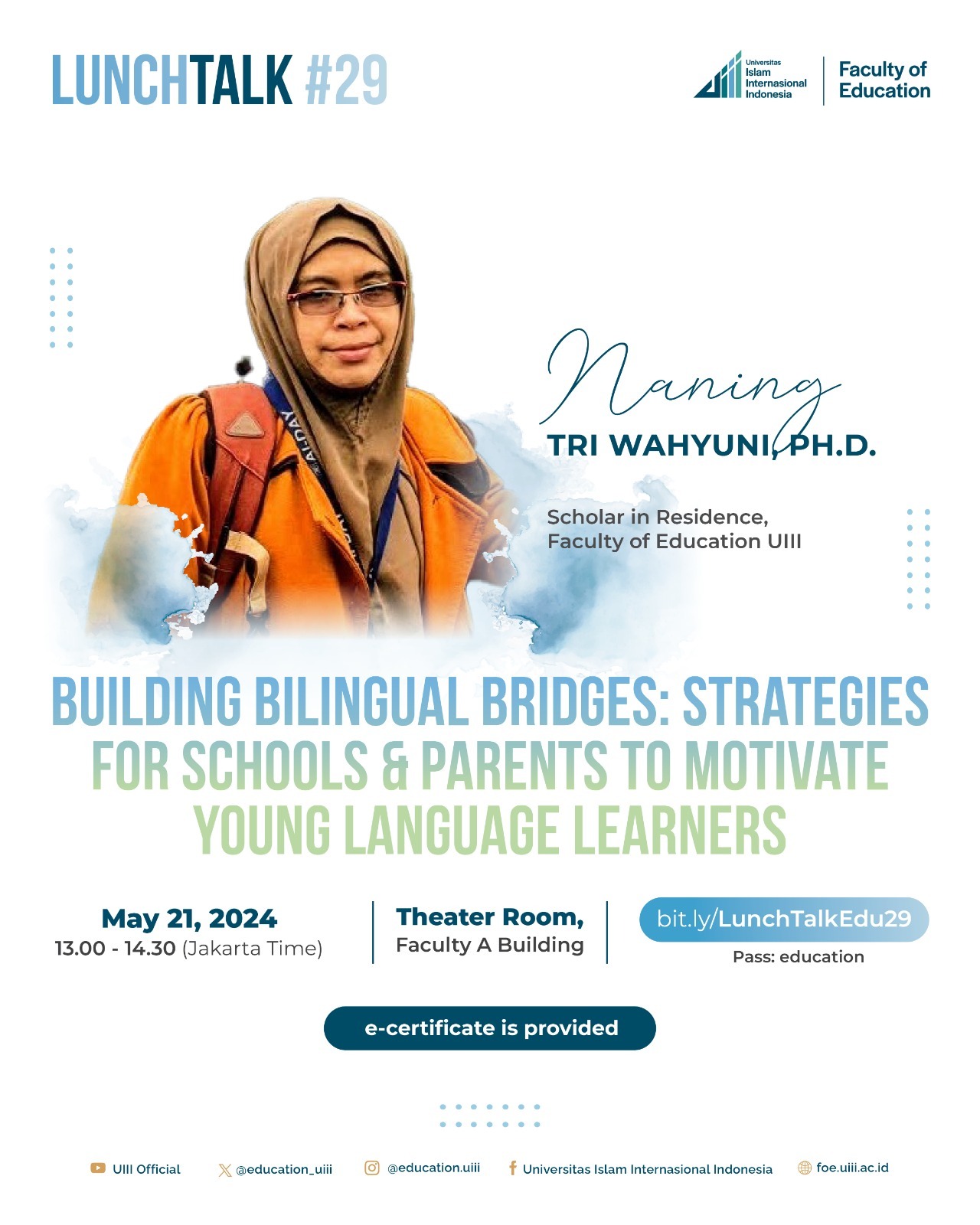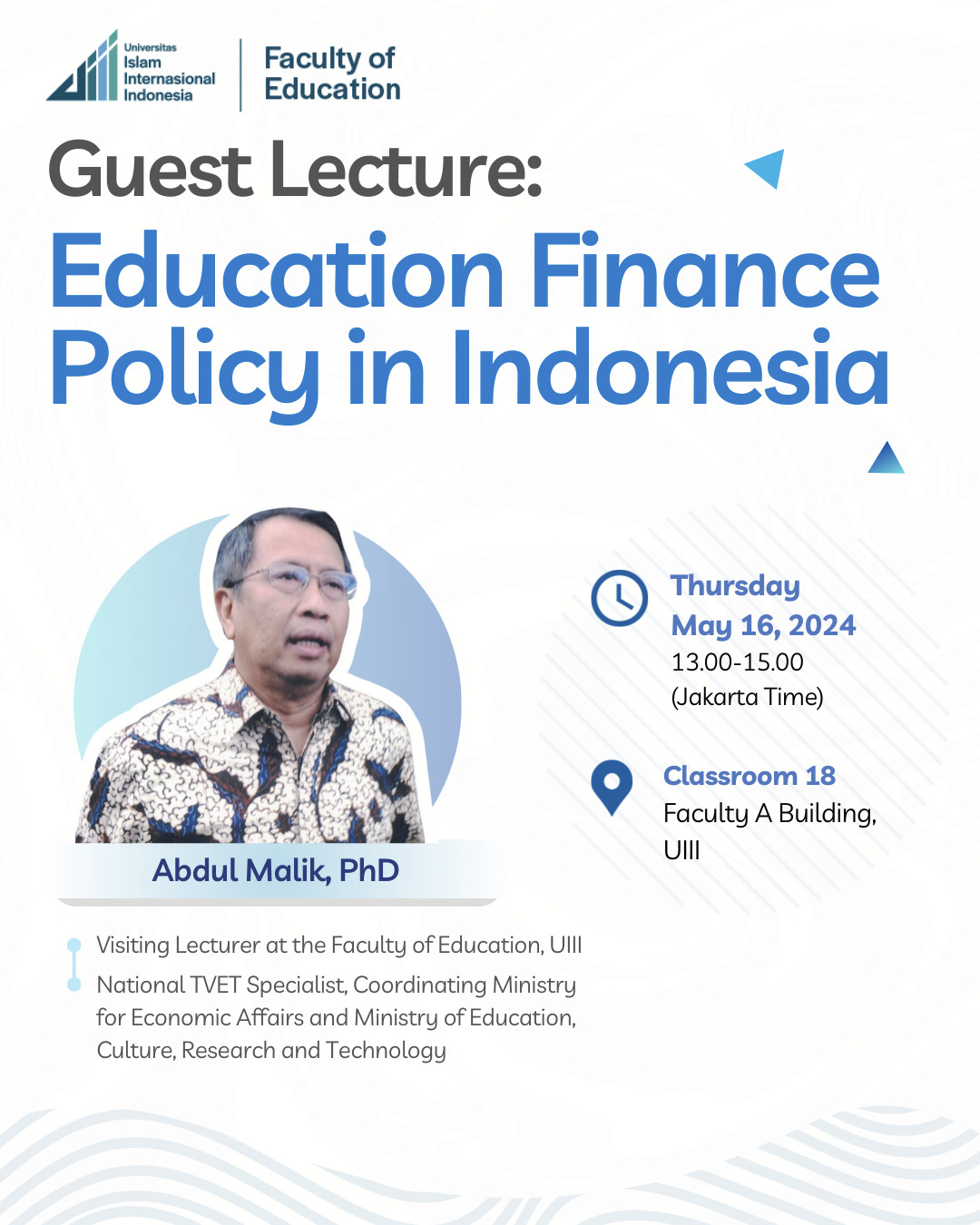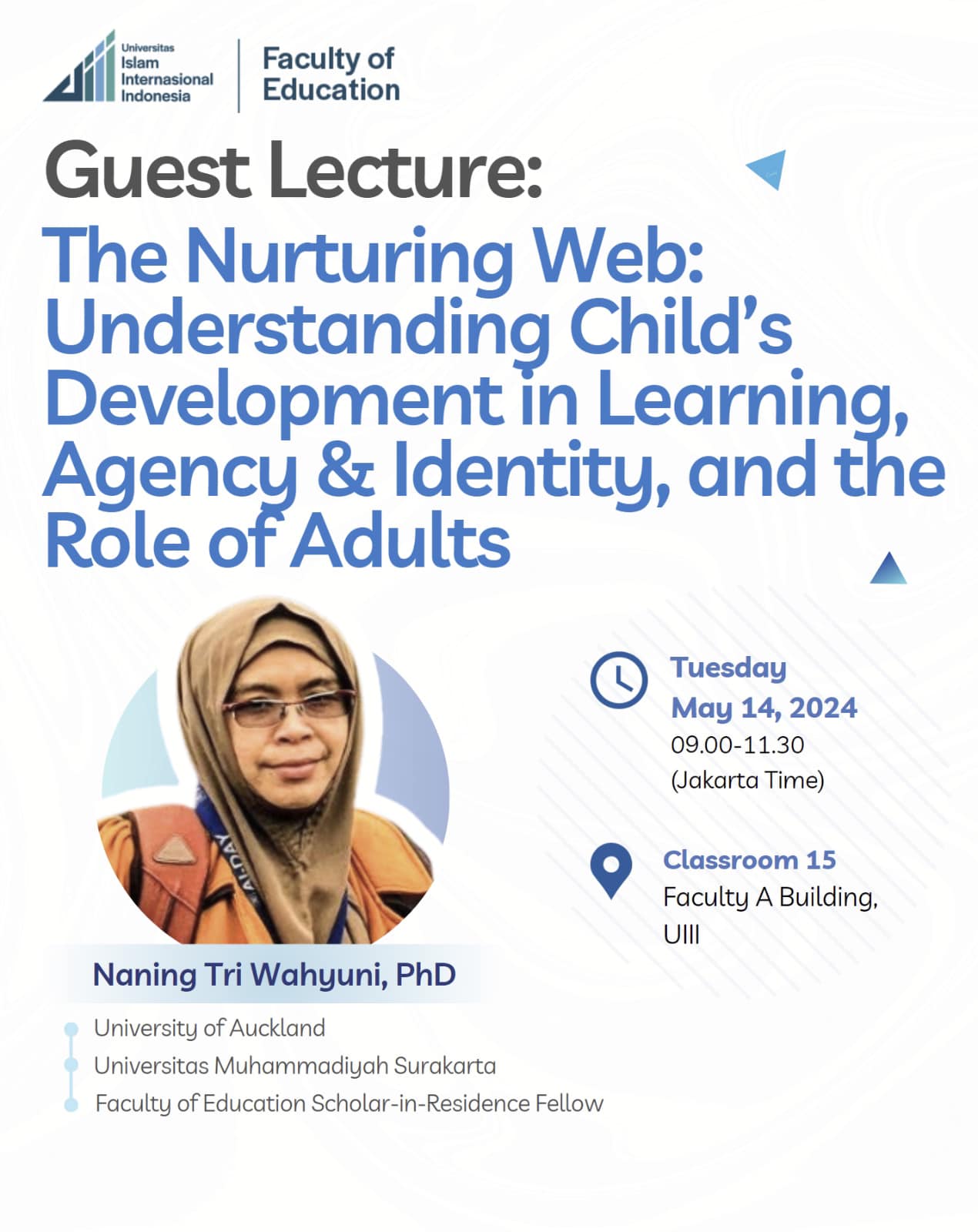FoE UIII's lecturer provided workshop about Rasch Model measurement for teachers in Miri, Sarawak, Malaysia
 The Rasch model is a powerful tool in cognitive testing, transforming raw scores into interval measures, which allows for more precise and meaningful interpretations of test results. On Thursday 23 May 2024, Dr Bambang, one of the lecturer in Faculty of Education UIII, provided whole day workshop for teachers in Miri, Sarawak, Malaysia. The workshop introduces the fundamentals of the Rasch model, focusing on its application in cognitive assessment, particularly about instrument analysis as well as person analysis. Participants learned how the model ensures that test items are appropriate for different ability levels, providing a fair and accurate measure of cognitive skills. Through hands-on sessions, attendees will practice calibrating test items and interpreting Rasch output using relevant software. Key topics include item difficulty, person ability estimation, and the creation of invariant measurement scales. The workshop is designed especially for teachers to enhance their understanding of test adn item development, and data analysis in cognitive testing. By the end, workshop participants equipped with the skills to apply the Rasch model to improve the reliability and validity of cognitive assessments in their respective teaching subject.
The Rasch model is a powerful tool in cognitive testing, transforming raw scores into interval measures, which allows for more precise and meaningful interpretations of test results. On Thursday 23 May 2024, Dr Bambang, one of the lecturer in Faculty of Education UIII, provided whole day workshop for teachers in Miri, Sarawak, Malaysia. The workshop introduces the fundamentals of the Rasch model, focusing on its application in cognitive assessment, particularly about instrument analysis as well as person analysis. Participants learned how the model ensures that test items are appropriate for different ability levels, providing a fair and accurate measure of cognitive skills. Through hands-on sessions, attendees will practice calibrating test items and interpreting Rasch output using relevant software. Key topics include item difficulty, person ability estimation, and the creation of invariant measurement scales. The workshop is designed especially for teachers to enhance their understanding of test adn item development, and data analysis in cognitive testing. By the end, workshop participants equipped with the skills to apply the Rasch model to improve the reliability and validity of cognitive assessments in their respective teaching subject.


Course Evaluation: Mid Semester 2023/2024
 Faculty of Education UIII's course evaluations serve as valuable feedback mechanisms from students to express their opinions on the quality of teaching, course content, and overall learning experience they had in a semester. The students got the opportunity twice in a semester to give their assessment about the course, in the middle of semester as well as in the end of semester. These evaluations typically consist of structured questions (close ended with rating scale) and also open-ended comments, allowing students to rate aspects such as instructor effectiveness, course organization, clarity of materials, and relevance to learning objectives. They provide instructors with insights into their teaching methods and areas for improvement, in the four dimension which are: Course Materials and Structure, Course Delivery, Learning Assessment, Lecturer's Connection and Encouragement, Student Engagement and Involvement, and General / Overall Rating. Moreover, course evaluations aid universities in assessing the effectiveness of their academic programs and identifying areas for enhancement. By soliciting student feedback, the faculty can continuously refine their courses to meet the evolving needs of students and maintain high standards of education. Ultimately, course evaluations play a crucial role in fostering a culture of accountability, transparency, and continuous improvement within our faculty and university.
Faculty of Education UIII's course evaluations serve as valuable feedback mechanisms from students to express their opinions on the quality of teaching, course content, and overall learning experience they had in a semester. The students got the opportunity twice in a semester to give their assessment about the course, in the middle of semester as well as in the end of semester. These evaluations typically consist of structured questions (close ended with rating scale) and also open-ended comments, allowing students to rate aspects such as instructor effectiveness, course organization, clarity of materials, and relevance to learning objectives. They provide instructors with insights into their teaching methods and areas for improvement, in the four dimension which are: Course Materials and Structure, Course Delivery, Learning Assessment, Lecturer's Connection and Encouragement, Student Engagement and Involvement, and General / Overall Rating. Moreover, course evaluations aid universities in assessing the effectiveness of their academic programs and identifying areas for enhancement. By soliciting student feedback, the faculty can continuously refine their courses to meet the evolving needs of students and maintain high standards of education. Ultimately, course evaluations play a crucial role in fostering a culture of accountability, transparency, and continuous improvement within our faculty and university.


Yayasan Penggerak Indonesia Cerdas (Pengincer) visited Faculty of Education UIII
 Yayasan Penggerak Indonesia Cerdas (Pengincer), especially the Pengincer Research Center (PRC) unit have visited Faculty of Education, Universitas Islam Internasional Indonesia on Monday, 6 May 2024. Previously, last year, Pengincer researchers attended summer course of research methods organized by Faculty of Social Sciences UIII. They learned some research skills which included experimental research design, case studies design, how to use Quirkos to do qualitative data coding, and Rash Model Analysis for instrument testing. All of this equiped Pengincer reseracher to do their own research. For the next collaboration, Pengincer join with FoE UIII will conduct their research disemination activities about literacy and numeracy study on July 2024 at beuatiful UIII campus in Depok, West Java.
Yayasan Penggerak Indonesia Cerdas (Pengincer), especially the Pengincer Research Center (PRC) unit have visited Faculty of Education, Universitas Islam Internasional Indonesia on Monday, 6 May 2024. Previously, last year, Pengincer researchers attended summer course of research methods organized by Faculty of Social Sciences UIII. They learned some research skills which included experimental research design, case studies design, how to use Quirkos to do qualitative data coding, and Rash Model Analysis for instrument testing. All of this equiped Pengincer reseracher to do their own research. For the next collaboration, Pengincer join with FoE UIII will conduct their research disemination activities about literacy and numeracy study on July 2024 at beuatiful UIII campus in Depok, West Java.


FoE UIII's staff as a guest lecture at Universitas Multimedia Nusantara, Serpong, Tangerang
 The Rasch model is a powerful tool in measurement theory, particularly in educational and psychological assessments as well as for business research. It provides a framework for understanding how individuals respond to items on a scale and how these responses relate to their underlying ability or trait. In a guest lecture on the Rasch model, key points would include its fundamental principles, such as the requirement of item independence and the concept of person and item parameters. Additionally, discussing practical applications, such as test development, item analysis, and person ability in the context of business research, would be valuable. It's important to address common misconceptions and challenges in implementing the Rasch model, along with strategies for interpretation and validation. Demonstrating its versatility in business research, like customer satifcation, employee motivation, consumer product choice or market research, would highlight its broad utility. Overall, this guest lecture aims to equip participants with a foundational understanding and practical insights into utilizing the Rasch model effectively. The guest lecturer conducted on 2nd May 2024 at Universitas Multimedia Nusantara building in Serpong, Tangerang, which master of technology management, faculty of business students attended the lecture.
The Rasch model is a powerful tool in measurement theory, particularly in educational and psychological assessments as well as for business research. It provides a framework for understanding how individuals respond to items on a scale and how these responses relate to their underlying ability or trait. In a guest lecture on the Rasch model, key points would include its fundamental principles, such as the requirement of item independence and the concept of person and item parameters. Additionally, discussing practical applications, such as test development, item analysis, and person ability in the context of business research, would be valuable. It's important to address common misconceptions and challenges in implementing the Rasch model, along with strategies for interpretation and validation. Demonstrating its versatility in business research, like customer satifcation, employee motivation, consumer product choice or market research, would highlight its broad utility. Overall, this guest lecture aims to equip participants with a foundational understanding and practical insights into utilizing the Rasch model effectively. The guest lecturer conducted on 2nd May 2024 at Universitas Multimedia Nusantara building in Serpong, Tangerang, which master of technology management, faculty of business students attended the lecture.

Guest Lecture: The Wellness Guide for PhD Students
 In this occasion Dr Zuliana will share about tips of doing research at higher level. The Wellness Guide for PhD Students serves as a comprehensive resource addressing the unique challenges and stresses encountered during doctoral studies. It covers various aspects of physical, mental, and emotional well-being tailored specifically to the demands of academic research and writing. The guide offers strategies for managing time effectively, maintaining a healthy work-life balance, and combating feelings of isolation often experienced by PhD candidates. It emphasizes the importance of self-care practices such as exercise, mindfulness, and seeking social support networks. Additionally, it provides tips for coping with academic pressure, navigating supervisor relationships, and dealing with setbacks in research. By promoting holistic wellness, the guide aims to empower PhD students to thrive academically while prioritizing their mental and physical health, ultimately fostering a more sustainable and fulfilling doctoral experience.
In this occasion Dr Zuliana will share about tips of doing research at higher level. The Wellness Guide for PhD Students serves as a comprehensive resource addressing the unique challenges and stresses encountered during doctoral studies. It covers various aspects of physical, mental, and emotional well-being tailored specifically to the demands of academic research and writing. The guide offers strategies for managing time effectively, maintaining a healthy work-life balance, and combating feelings of isolation often experienced by PhD candidates. It emphasizes the importance of self-care practices such as exercise, mindfulness, and seeking social support networks. Additionally, it provides tips for coping with academic pressure, navigating supervisor relationships, and dealing with setbacks in research. By promoting holistic wellness, the guide aims to empower PhD students to thrive academically while prioritizing their mental and physical health, ultimately fostering a more sustainable and fulfilling doctoral experience.
Recording on YouTube:
Guest Lecture: Bookmark Standard Setting Using Rasch Measure as Guideline
 The end product of any test is to clasify test taker ability, in this case standard setting is the one that should be clear. Standard setting using Rasch model involves determining the proficiency level required to perform adequately on a test or assessment. Unlike traditional methods, Rasch standard setting relies on the mathematical properties of item response theory. It considers both the difficulty of test items and the ability of test takers on a common latent scale. The process typically begins by calibrating test items using Rasch analysis to establish their difficulty levels. Then, a panel of experts or stakeholders decides the minimum proficiency level needed for test takers to be deemed competent. Rasch estimates help ensure that this standard is fair and consistent across different forms of the test. Ultimately, Rasch standard setting provides a rigorous and data-driven approach to defining proficiency levels, enhancing the reliability and validity of assessment outcomes. Dr Mohd Zali will share the process using Rasch model measurement approach in this online session.
The end product of any test is to clasify test taker ability, in this case standard setting is the one that should be clear. Standard setting using Rasch model involves determining the proficiency level required to perform adequately on a test or assessment. Unlike traditional methods, Rasch standard setting relies on the mathematical properties of item response theory. It considers both the difficulty of test items and the ability of test takers on a common latent scale. The process typically begins by calibrating test items using Rasch analysis to establish their difficulty levels. Then, a panel of experts or stakeholders decides the minimum proficiency level needed for test takers to be deemed competent. Rasch estimates help ensure that this standard is fair and consistent across different forms of the test. Ultimately, Rasch standard setting provides a rigorous and data-driven approach to defining proficiency levels, enhancing the reliability and validity of assessment outcomes. Dr Mohd Zali will share the process using Rasch model measurement approach in this online session.
Lunch Talk #29: Building Bilingual Bridges: Strategies for Schools & Parents to Motivate Young Language Learners

You are invited to join the Lunch Talk #29 at the Faculty of Education, UIII
Naning Tri Wahyuni, Ph.D. (Scholar in Residence, Faculty of Education UIII) will share about: “Building Bilingual Bridges: Strategies for Schools & Parents to Motivate Young Language Learners”.
The Talk will discuss the role of schools (teachers) and parents in children’s Second Language/Foreign Language learning. Young language learners mostly arrive in the classroom with varying degrees of competence. To support their learning journey, teachers should provide cultural enrichment and accommodate students' interests and learning styles that positively contribute to each child's personal development. Schools and teachers must also make links to understand the children's background, their family background, and their growing environment. This can be easily achieved by connecting the schools and the parents in home-school partnership program. Home-school links are essential for all learners, especially young children, as parents mostly have a strong influence on their learning development. Educational practices cannot be restricted to the school only, where children spend less time. Thus, parents must be school partners in their children's education. The highlighted messages from the Talk will be understanding factors associated with children’s interest and motivation because they are critical for their learning success, in which schools, teachers, and parents can work together to realize the idea.
Day/Date: Tuesday/May 21, 2024
Time: 13.00-14.30 WIB
Place: Theater, Faculty A Building
Online participation:
https://bit.ly/LunchTalkEdu29
E-Certificate is provided
Thank you!
Recording on YouTube
https://www.youtube.com/watch?v=XK3MQHQl2jg
Guest Lecture: Education Finance Policy in Indonesia
 Education finance policy refers to the strategies and mechanisms governments employ to allocate funds for educational sector purposes. It encompasses budget allocation, funding sources, distribution mechanisms, and expenditure priorities. Policies may vary widely between developed and developing countries, depending on factors such as economic resources, political priorities, and educational goals. Key considerations in education finance policy include equity, efficiency, and effectiveness. Equity aims to ensure that all students have access to adequate resources regardless of their socioeconomic background or geographic location. Efficiency focuses on optimizing resource allocation to achieve the best outcomes with the available funds. Effectiveness entails measuring the impact of spending on educational outcomes and adjusting policies accordingly. Education finance policy plays a crucial role in shaping the quality, accessibility, and inclusivity of education systems, ultimately influencing societal development and individual opportunities. In this occasion Dr Abdul Malik will share about Indonesian context and experience regard to education finance.
Education finance policy refers to the strategies and mechanisms governments employ to allocate funds for educational sector purposes. It encompasses budget allocation, funding sources, distribution mechanisms, and expenditure priorities. Policies may vary widely between developed and developing countries, depending on factors such as economic resources, political priorities, and educational goals. Key considerations in education finance policy include equity, efficiency, and effectiveness. Equity aims to ensure that all students have access to adequate resources regardless of their socioeconomic background or geographic location. Efficiency focuses on optimizing resource allocation to achieve the best outcomes with the available funds. Effectiveness entails measuring the impact of spending on educational outcomes and adjusting policies accordingly. Education finance policy plays a crucial role in shaping the quality, accessibility, and inclusivity of education systems, ultimately influencing societal development and individual opportunities. In this occasion Dr Abdul Malik will share about Indonesian context and experience regard to education finance.


Public Lecture: From Student Mobilization to Service Learning: Kuliah Kerja Nyata in Indonesian Higher Education
 We are thrilled to inform you that the Faculty of Education, UIII, in collaboration with the American Institute for Indonesian Studies (AIFIS) will conduct online public lecture.
We are thrilled to inform you that the Faculty of Education, UIII, in collaboration with the American Institute for Indonesian Studies (AIFIS) will conduct online public lecture.
In this public lecture, Dr. Brian MacHarg Garcia (Director of Academic Civic Engagement - Appalachian State University, USA) will speak on the topic: “From Student Mobilization to Service-Learning: Kuliah Kerja Nyata in Indonesia Higher Education.”
Day/Date: Wednesday/May 15, 2024Time: 08.00-09.30 (Jakarta Time)
Online participation:https://bit.ly/PublicLecture_Brian
E-Certificate is provided
Thank you!
Recorded on YouTube
https://www.youtube.com/watch?v=jgAyxHyqhlg&list=PLX82ye7O55ccrmhfMW1XPkbJNZchzujUs&index=3
Guest lecture: Understanding Child's Development in Learning, Agency and Identity, and the Role of Adults

Understanding a child's development in learning, agency, and identity involves recognizing how these elements interconnect and support growth. Learning development focuses on how children acquire knowledge and skills, emphasizing the importance of tailored educational approaches that cater to their individual needs and interests. Agency refers to a child's ability to make choices and take control of their learning process, fostering independence and self-confidence. Identity development is about how children perceive themselves and their place in the world, influenced by their experiences, relationships, and cultural context.
Adults play a crucial role in this developmental journey. They provide guidance, support, and a safe environment for exploration and learning. By encouraging curiosity and offering positive reinforcement, adults help children build self-esteem and resilience. Additionally, adults model behaviors and attitudes that children emulate, shaping their sense of identity and agency. Through attentive and responsive interactions, adults can nurture a child's growth holistically. In this occasion Dr Naning Tri Wahyuni describe about this issue.

